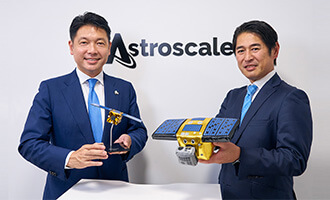July 2022
Sustainability NowA Sustainable World, Even in Space
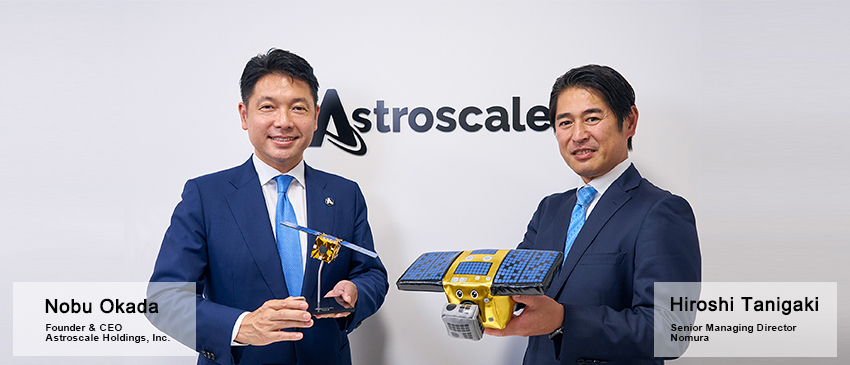
Over 100 million objects are said to be floating around in space. These pieces of “junk” or space debris are defunct human-made objects orbiting Earth, such as old satellites, rockets and fragments. According to the European Space Agency, there are approximately one million pieces of orbital debris between 1cm and 10cm in size and some 130 million pieces measuring from 1mm to 1cm. As the space industry grows, the debris in space is also piling up, posing a serious risk to the future use of space. But how does this problem affect us here on Earth?
Nobu Okada, Founder and CEO of Astroscale Holdings Inc., is on a mission to remove debris from space to preserve it for future generations. Nomura Senior Managing Director and Global Co-Head of Corporate Communications Hiroshi Tanigaki sat down with Mr. Okada to discuss the current situation in space and how it affects our daily lives.
Tanigaki: In the world of finance, sustainable finance is drawing increasing attention. More clients are raising funds and investing in sustainable projects in order to contribute to social solutions. At Nomura, our role is to create fund flows to meet the needs of these clients. Similarly, Astroscale is working to safeguard the orbital environment around Earth to secure future space sustainability. Tell us the story behind how Astroscale was established.
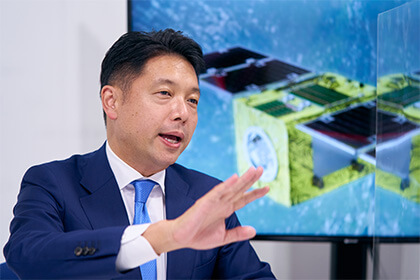
Okada:
It started out as a mid-life crisis. I was approaching 40 and thinking about what direction I wanted to take in the future. Around that time, I found a handwritten message that I had received from Mamoru Mohri, Japan’s first astronaut, when I was a student. The message said: “The challenge of space awaits you.” I was 15 when I met him at a camp at NASA’s Marshall Space Flight Center in the United States. Almost twenty-five years later, his words inspired me to go overseas to explore more on space.
I attended three academic conferences and what I discovered was that the biggest issue was not moon exploration or new rockets. It was space debris. In April 2013, I attended a space debris conference in Germany expecting to hear that they had come up with some spectacular solution that could be implemented within weeks. Instead, they were discussing solutions for 10 years down the road in the mid-2020s. One week later I founded Astroscale.
Tanigaki: So that sparked your passion for space?
Okada: At first, the people I met at space academic conferences told me not to do it. They told me there was no market for this type of business. They asked where I would get funding and warned me that this was not something for the private sector, and certainly not a venture for a startup company. But coming from a competitive industry like IT, a market with few competitors was a big business opportunity in my eyes. We depend on space for many things in our daily lives. But if we continue like this, space will be littered with debris and we will not be able to use it anymore. I remember being very excited and thinking to myself, “If there’s no market, I will create one. If there’s no solution, I will find one.”
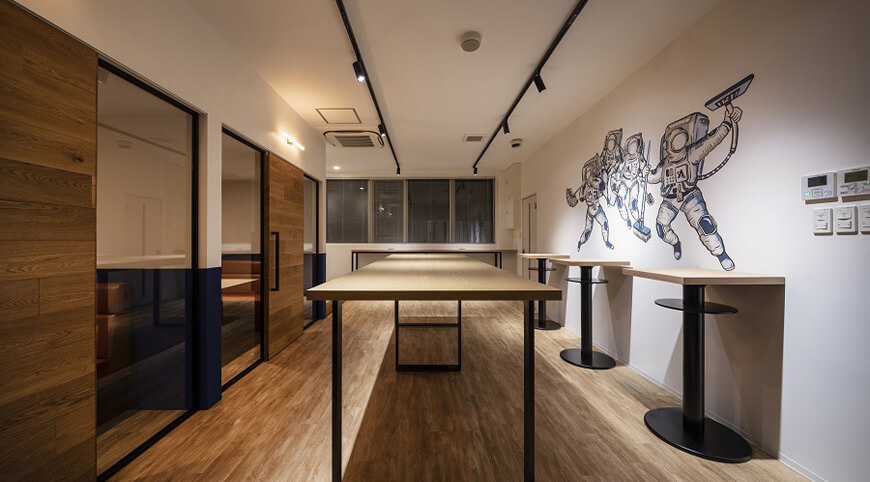
©Astroscale
Space Debris
Tanigaki: We see the word space debris more often now than we did in 2013, but I think it is still difficult for most people to grasp what is happening in space and to understand this social issue. What is the current situation in space?
Okada:
There are an estimated 40,0002 pieces of large man-made objects currently in space. Of these, 10 percent are artificial satellites still in operation and the remaining 90 percent is space junk, such as defunct satellites and fragments. They travel at an extremely high speed of 7-8km/s, can range in size from small to as large as a tour bus and all fly around in different directions.
You might think space is huge so this shouldn’t pose a big problem. However, if the debris stays in the same orbit for decades without being removed it will naturally become congested, and the more crowded the orbit gets, the higher the probability of a collision. In fact, there have been several collisions in the past. This is something we don’t usually think about, but satellite broadcasting on TV, the weather report, GPS, and even the internet all depend on satellite communications. If you knew you could not use your smartphone without satellites, it becomes more personal for you, right?
2. Source: Space debris by the numbers, European Space Agency (ESA)
We are starting to see a chain reaction where the debris generated from collisions is leading to more collisions. A small debris fragment moving at a speed of 8km/s can create a massive collision and cause a satellite to explode. How many times per month do you think we have near misses where a piece of debris comes within 1km of a satellite?
Tanigaki: I can’t imagine…
Okada: 2,000 times. That’s around 60 times a day. Objects in space have reached the threshold so the situation is now urgent.
Tanigaki: Given the urgent nature of this issue, I can understand why stakeholders around the world have such high expectations for your company. What kind of solutions are there?
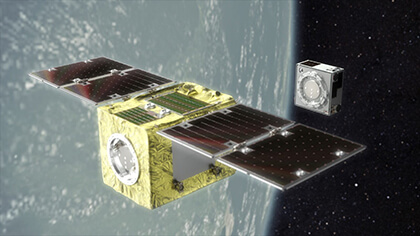
©Astroscale
Okada:
At Astroscale, we are adopting multiple approaches to improving the space environment. Our goal is to extend the life of satellites through a range of services such as observation, inspection, orbit maintenance and attitude control, as well as offering end-of-life satellite and debris removal services. This requires technologies that can safely and securely capture debris. We have been doing research into this kind of technology and in March 2021, we launched a demonstration mission called ELSA-d 3. In August 2021, we successfully demonstrated orbital debris capture using replica debris and in April this year we performed tracking and observation from a distance and proximity operations.
This is an unprecedented accomplishment, and we have been receiving a lot of inquiries. Space debris poses a serious threat and our team is working hard towards offering commercial removal services.
3. End-of-Life Services by Astroscale-demonstration, a debris removal demonstration satellite
Promoting “reusable” in Space
Tanigaki: So, who does all this space debris belong to? Isn’t it their responsibility to clean it up?
Okada:
For the most part, we know who the space debris belongs to, but there are currently no legally enforceable international laws governing space debris. Around 100 countries have space programs, the top three being the US, Russia and China. But it’s not as simple as assigning responsibility for space debris to these three countries. People all over the world benefit from space exploration. So who should be held responsible, the countries developing space programs or we who benefit? That is an unending debate.
One reason for the mounting space debris is the absence of a value chain. In the case of a motor vehicle, there is an established market from maintenance services such as refueling and repairs to scrapping. If we are able to fill these gaps in the space industry, we can change from the “disposable” culture we have now to a more reusable and sustainable space.
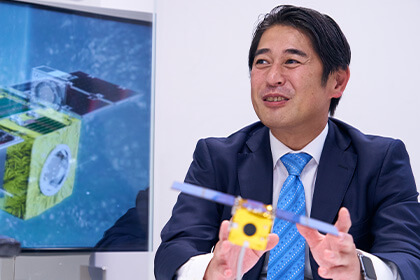
Tanigaki: Commercial space travel has created a significant buzz recently, with some expecting it to become the norm in a few years.
Okada: There are 10 people4 currently stationed in space, seven on the International Space Station and three on China’s space station. In the next eight or so years, I think this number might be in the hundreds. With construction of private hotels set to start soon, space travel that has only existed in science fiction to date is on its way to becoming a reality. Things have changed tremendously, so it is important to have a safe space environment.
4. As of June 5, 2022
Tanigaki: Thanks to Astroscale’s efforts, awareness about space debris has also increased.
Okada:
The issue has gained international recognition. At the 2021 G7 Leaders’ Summit held in Cornwall, England, countries issued a joint statement in which they committed to the safe and sustainable use of space. The statement also emphasized the need for space debris removal and on-orbit services to protect our orbital environment.
As a company, we were delighted to be recently named to the Time’s 100 most influential companies of 2022. If Astroscale is truly impacting the world, this means the world is moving towards a more sustainable space environment. This is great encouragement for members of our team who are working tirelessly towards this goal every day.
Our focus at Astroscale is on-orbit servicing. For example, there are mechanisms in place to limit the impact of accidents or traffic jams on the highway, such as traffic information and road services. We offer “road services” for space. Our goal is to make this widespread, so that by 2030 it becomes the norm rather than a special service. In order to achieve this, we are not only working on the technology aspect but also rulemaking and business model creation.
2030
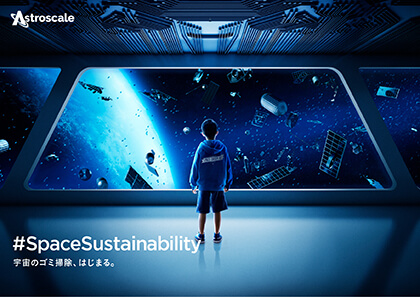
©Astroscale
Tanigaki: That means international collaboration is essential.
Okada: Discussions on space debris regulations have finally started at the national level. I believe some rules will be made over the next three to four years and necessary adjustments made between countries in the following four to five years. Why 2030? Because of the SDG goals. If we do not have sustainable space technologies, we cannot achieve the 17 SDG goals. Without satellite data, you can’t get rid of educational inequalities between regions, for example.
Tanigaki: So essentially space is the “starting point” for the SDGs. What are some of the challenges to achieving the 2030 goals?
Okada:
At the micro level, employment is an issue. We have a capable team of about 300 people worldwide who I have the utmost confidence in. As our team grows, a big task for me is considering how we can grow both as individuals and as a company.
At the macro level, the challenge is whether we can build an ecosystem for autonomous business. Private companies must take the lead in building an open and free market that encourages healthy competition and growth. This will lead to more funding from investors, which will benefit our economy and cause money to circulate. For this to happen, debris removal and clearly defined rules are essential.
Most importantly, we must not rob our future children of the opportunity to travel to another planet. The problem of space debris must be resolved by our generation.
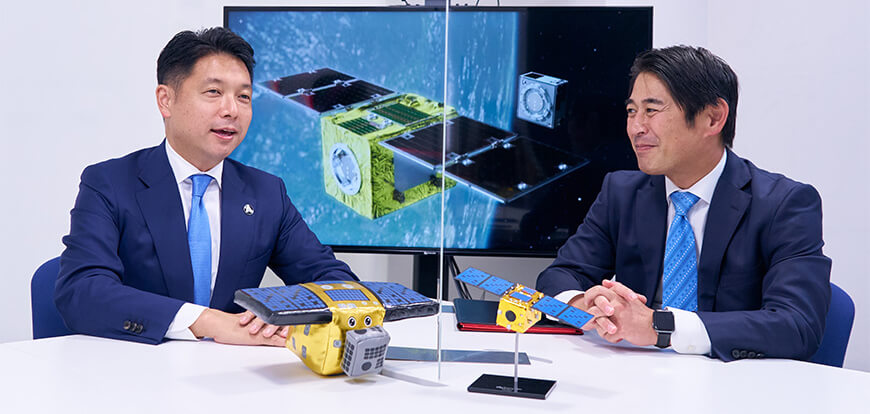
Nobu Okada
Nobu Okada founded Astroscale in April 2013 with a vision to secure a sustainable orbital environment for future generations. Prior to founding Astroscale, he was an IT entrepreneur and strategy consultant, and before that he worked for McKinsey & Company and Japan’s Ministry of Finance. Mr. Okada was named Honorary Chair of World Space Week 2022. He is Vice President of the International Astronautical Federation (IAF), a member of the International Academy of Astronautics (IAA) and the Space Generation Advisory Council (SGAC) Advisory Board, and a Fellow of the Royal Aeronautical Society (FRAeS). He holds a bachelor’s degree in agriculture from the University of Tokyo and an MBA from the Krannert School of Business, Purdue University. He is a native of Kobe City in Hyogo, Japan.
Images provided by Astroscale
Photos by Toru Hanai
